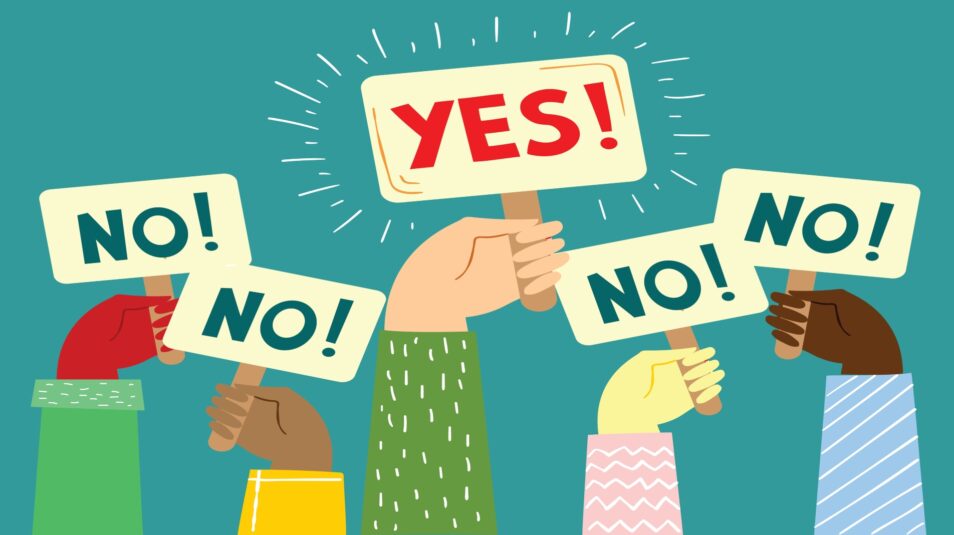A teammate brings you an idea. What will you do?

Leadership
April 23, 2021
Wally Bock
Author + Blogger + Ghostwriter + Writing Coach
Topics
idea, idea boneyard, ideas, leaders, Leadership, teammates, TeamworkThis was back in the days when more people smoked. Ashtrays were everywhere.
Jim was my friend, and he didn’t smoke, but when I stopped by for a visit, I noticed an ashtray on his desk. It wasn’t just an ashtray; it was a poorly-made clay ashtray. The words “I love you” were written in the clay, now hardened.
When I asked him about the ashtray Jim smiled. “My son made that at camp,” he said. “They had all the kids make ashtrays. And Jimmy was little then, so he wasn’t too good at making the craft project look, shall we say, ‘finished.’ But he could write “I love you” on the rim of the ashtray. I keep it to remind myself that even imperfect gifts can be acts of love.”
That ashtray on Jim’s desk is a good reminder of how to deal with the ideas that teammates bring you. Lots of them will be unfinished like that ashtray. Some may not turn out to be useful. But they’re all gifts.
Say “Thank you” and More
When a teammate brings you an idea, say, “Thank you,” but don’t stop there. Tell the person you appreciate the effort to come up with the idea. Tell them you appreciate them taking the time and making the effort to share the idea with you.
Act grateful. You’ve just received a gift. Then what?
Go Practical
Figure out if the idea is worth pursuing. Simple experiments are the best way. Your experiments should have two goals. Test the idea to determine what it will take to make the idea work. Learn enough to determine whether the idea is worth adopting.
Sometimes you won’t be able to do live experiments. But you can do thought experiments where you walk through things in your mind.
Don’t do this yourself. That will only add one more stick to the pile of things you must do. Make the initial experiments the responsibility of the person who brought you the idea. Suggest they get help from teammates. Remind them that it’s not enough for an idea to be good. It must also help the team or the larger organization accomplish the mission.
That may be the last you hear of the idea. Some ideas won’t work or won’t work well enough to justify adopting them. Some teammates won’t ever do the experiments to test their idea.
But some ideas will get modified into good ideas. Then, it’s your turn. Should you adopt the idea or push your organization to adopt the idea?
The Hard Call
It doesn’t take any brainpower, willpower, or courage to say “no” to a bad idea. The hard thing is to say “no” to a good idea that doesn’t support the most important mission. That’s what you must do sometimes.
When that happens, thank the experimenters. Explain why you think the idea should be shelved. Then, emulate Nucor.
Create an Idea Boneyard
Nucor is one of the most innovative companies on the planet. Most of the ideas they test come from Nucor’s own people. And the company accepts the idea that half their investments in new ideas and technologies will yield no usable results.
Every Nucor plant has a storehouse for the equipment that was tried and rejected. They're kept around so Nucor's people can learn from things that didn't work or maybe get an idea about how to make it work in a different situation.
Create your own “Idea Boneyard.” Maintain a file with notes on good ideas that didn’t work out. When you face a challenge, check the Boneyard file for ideas and inspiration.
Takeaways
When a teammate brings you an idea treat it like a gift, because it is.
The teammate who brings an idea should be in charge of testing it to determine value.
Saying “no” to a bad idea is easy. Saying “no” to a good idea that doesn’t support the mission is hard.
Create an “idea boneyard” where you keep notes on ideas that didn’t work. They might work in another situation. They may inspire better ideas.






